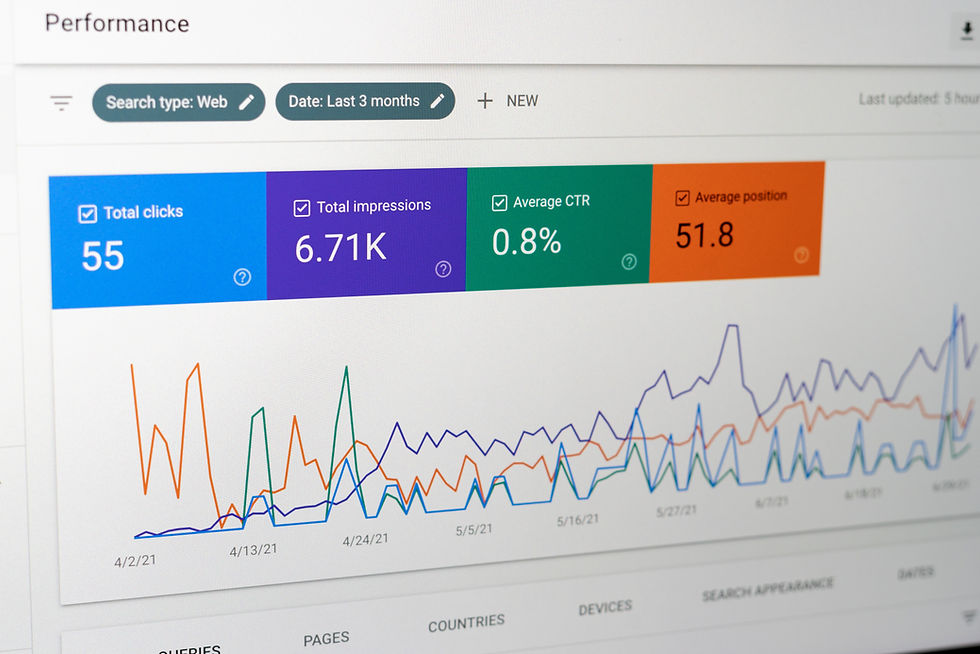Navigating AI: How It's Transforming Search and What It Means for SEO
- Ray Velasquez
- Mar 31
- 4 min read

Artificial intelligence (AI) is fundamentally transforming how users search, access, and interact with information. As we navigate a new era, distinct trends are emerging:
AI-Powered Search Assistants: Some users are bypassing traditional search engines entirely, relying on AI chatbots and assistants like ChatGPT for their information needs. These AI tools can provide comprehensive answers by synthesizing information from multiple sources, effectively acting as intermediaries between users and the vast expanse of online data.
Google's Gemini Integration: Google has integrated its advanced AI model, Gemini, directly into search results. This integration often presents AI-generated summaries, known as "AI Overviews," at the top of search pages. These overviews provide concise, contextual answers to user queries, reducing the need to sift through links.
These developments are reshaping the search experience, moving away from the traditional list of blue links towards more conversational and direct answer formats. As AI continues to advance, we can expect further innovations in how we discover and consume information online, potentially rendering traditional keyword-based search methods obsolete.
The AI-Driven Shift in Search Behavior

Traditionally, search engines primarily relied on keyword matching to deliver results. However, AI technologies like Google’s BERT and RankBrain have transformed this approach, allowing search engines to understand the nuances of human language better. This means that search queries are now interpreted in context, enabling search engines to deliver results based on user intent rather than exact keyword matches.
This shift also means that the way users engage with search is changing. More consumers are utilizing voice search, asking complex questions, and seeking instant information. Consequently, businesses must adapt their content strategies to align with these evolving behaviors. Brands that can anticipate and answer user queries succinctly will ultimately rise above the competition.
Interesting Insight: AI-powered search assistants like ChatGPT are becoming increasingly popular for their ability to provide detailed answers without requiring users to visit multiple websites. This trend highlights the importance of creating comprehensive, authoritative content that can be easily integrated into AI responses.
Essential Strategies for AI-Driven Search Success
To thrive in this AI-influenced landscape, businesses need to adopt strategies that resonate with both search engines and users. Here are some key tactics that the best digital marketing agency would recommend:
1. Embrace Natural Language and Keywords
As users increasingly leverage voice search and conversational queries, it’s essential for brands to optimize content with natural language. Incorporate long-tail keywords and phrases that mimic how people talk. For example, instead of targeting just “running shoes,” consider phrases like “best running shoes for beginners.” This approach aligns with how consumers search and can improve your chances of appearing in relevant search results.
2. Focus on Quality and Depth of Content
Content that provides value and depth is more likely to perform well in AI-driven search results. Aim to create comprehensive resources that thoroughly address user queries. Case studies, in-depth guides, and long-form content not only engage readers but also signal to search engines that your content is authoritative on the subject. Moreover, regularly updating your content can keep it fresh and relevant, contributing to better search performance.
Interesting Insight: In 2025, semantic search optimization will dominate SEO strategies. Creating interconnected content clusters that explore related topics will allow search engines to understand context better, favoring holistic approaches over fragmented keywords.
3. Optimize for Featured Snippets
Featured snippets are becoming increasingly popular, and they provide a valuable opportunity for brands to capture attention in search results. Structure your content to answer specific questions clearly and concisely. Use bullet points, tables, and direct answers that can be picked up by search engines. By doing so, you increase the likelihood of your brand appearing in this coveted position, driving more traffic to your site.
4. Implement Structured Data
Utilizing structured data markup can help search engines understand your content better. This semantic markup enhances your chances of securing rich snippets, knowledge panels, and other enhanced search features. By providing explicit information about your products and services, you can improve visibility and attract clicks.
5. Enhance User Experience
An engaging and intuitive user experience (UX) is paramount in the age of AI. Ensure that your website is fast, mobile-friendly, and easy to navigate. A seamless UX not only encourages visitors to stay longer but also reduces bounce rates—factors that search engines consider when ranking content. Additionally, consider implementing interactive elements like chatbots or quizzes to engage users and gather valuable data.
Interesting Insight: AI-powered tools can now analyze user behavior to create hyper-personalized experiences. For example, dynamic web pages can adapt content based on a visitor’s occupation or browsing history, enhancing engagement.
The Future is Here: Stay Ahead of the Curve

As we move further into an era dominated by AI, the implications for businesses are profound. By Q3 2025, AI Overviews will reduce organic traffic for informational queries but increase focus on bottom-funnel keywords with strong purchase intent. This shift emphasizes the importance of targeting transactional keywords and creating content that supports the final stages of the customer journey.
Shameless Plug: For business owners looking to compete, partnering with a specialized digital marketing agency for small businesses can provide the support needed to implement these strategies effectively. At Score Marketer, we are committed to helping brands of all sizes harness the power of AI and improve their search visibility.
By understanding its impact on search behavior and adapting your strategies accordingly, your brand can thrive in an increasingly competitive digital marketplace. Start implementing these strategies today and watch as your online presence transforms, driving engagement and growth well into the future!
Comments